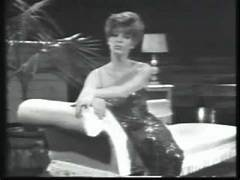-----------ooOoo-----------
Cry Me a River
-----------ooOoo-----------
This started off as an Origin of Words and Phrases, with me wondering where the phrase had come from, but ended up as a Song Spot as well.
-----------ooOoo-----------
Meaning:
A sarcastic response to someone who is expressing sadness or complaining and for whom you have no sympathy.
-----------ooOoo-----------
Origin:
"Cry Me a River" is a popular American torch song, written by Arthur Hamilton, first published in 1953 and made famous in 1955 with the version by Julie London.
-----------ooOoo-----------
Song versions:
The song was originally written for jazz great Ella Fitzgerald but the version that is way out in front as Number 1 is that by Julie London. Watching her sing it is feeling that she really has been wronged, that she is singing from personal experience, making other versions only performances. Indeed, the Julie London version is now added to my list of hurt/payback songs, along with:
Alanis Morisette: You Oughta Know
Bob Dylan: Positively 4th Street
Carly Simon: You’re So Vain
Adele: Rolling in the Deep
Kenny Rogers: Coward of the County
The Chicks (formerly The Dixie Chicks): Goodbye Earl
Vicki Lawrence: The Night the Lights went out in Georgia
Video links:
Julie London:
Ella Fitzgerald:
Michael Buble:
Barbara Streisand:
Diana Krall:
I am aware that there is a version by Justin Timberlake, it’s not one I like:
-----------ooOoo-----------
Lyrics:
Now you say you're lonely
You cried the long night through
Well, you can cry me a river, cry me a river
I cried a river over you
Now you say you're sorry
For being so untrue
Well, you can cry me a river, cry me a river
I cried, cried, cried a river over you
You drove me, nearly drove me, out of my head
While you never shed a tear
Remember, I remember, all that you said
You told me love was too plebeian
Told me you were through with me and
Now you say, you say you love me
Well, just to prove you do
Come on and cry me a river, cry me a river
Cause I cried a river over you
You drove me, nearly drove me, out of my head
While you never shed a tear
Remember, remember, all that you said
Told me love was too plebeian
Told me you were through with me and
Now, now you say you love me
Well, just to prove you do
Come on and cry, cry, cry me a river, cry me a river
Cause I cried a river over you
-----------ooOoo-----------
Comments and notes:
Arthur Hamilton, who wrote the song, later said: "I had never heard the phrase. I just liked the combination of words... Instead of 'Eat your heart out' or 'I'll get even with you,' it sounded like a good, smart retort to somebody who had hurt your feelings or broken your heart." He was initially concerned that listeners would hear a reference to the Crimea, rather than "..cry me a...", but said that "..sitting down and playing the melody and coming up with lyrics made it a nonissue."
A bluesy jazz ballad, "Cry Me a River" was originally written for Ella Fitzgerald to sing in the 1920s-set film Pete Kelly's Blues (released 1955). According to Hamilton, he and Julie London had been high school classmates, and she contacted him on behalf of her husband, Jack Webb (of Dragnet fame), who was the film's director and was looking for new songs for its soundtrack.
Julie and Jack Webb with children Stacey and Lisa, 1953. Married 1947, divorced 1954.
After the song was dropped from the film, Fitzgerald first released her version on Clap Hands, Here Comes Charlie! in 1961. The song was also offered to Peggy King, but Columbia Records A&R chief Mitch Miller objected to the word "plebeian" in the lyric. (It means common, from a commoner in ancient Rome).
The song's first release was by actress and singer Julie London on Liberty Records in 1955, backed by Barney Kessel on guitar and Ray Leatherwood on bass. London had been urged to record the song by Bobby Troup, whom she would later marry after her divorce from Webb. A performance of the song by London in the 1956 film The Girl Can't Help It, helped to make it a bestseller (reaching no. 9 on US and no. 22 on the UK Singles Chart). It became a gold record, and in 2016, it was inducted by the Library of Congress in the National Recording Registry. In 2001, the Julie London version of "Cry Me a River" was inducted into the Grammy Hall of Fame.




No comments:
Post a Comment
Note: Only a member of this blog may post a comment.